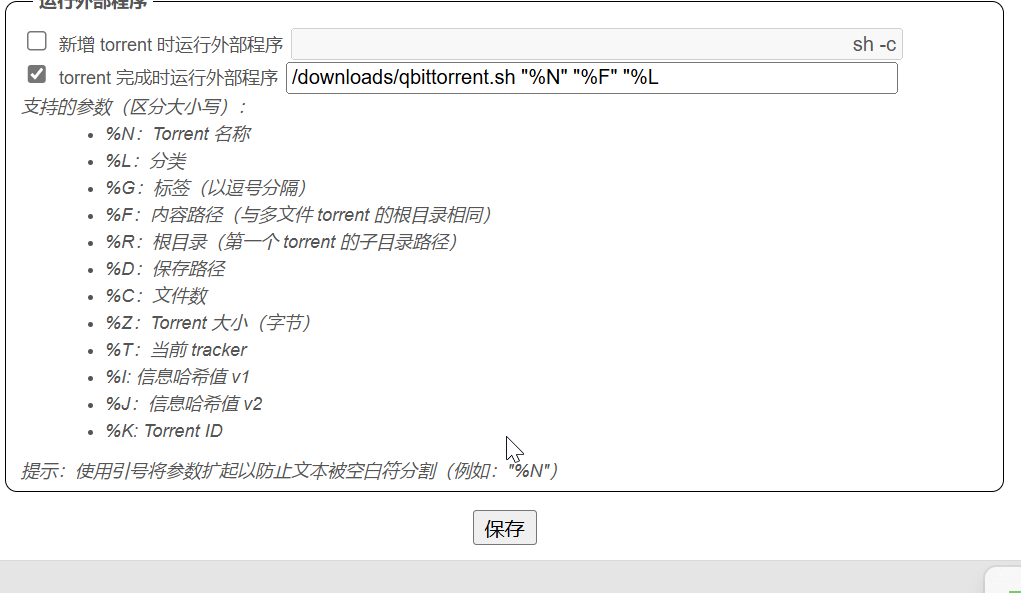之前一直是按照那是云的这篇文章设置的,http://www.nasyun.com/thread-77024-1-1.html#:~:text=%E6%96%B9%E4%BE%BFqBittorr
网页 2022 年 5 月 18 日 — 方便 qBittorrent 下载完成后 做种和刮削,搞了个脚本来自动按分类文件,创建视频文件硬链接。 主要 为了解决*.nfo 文件和海报图片
可惜这篇文章打不开了。
问一下大佬,qBittorrent 需要怎么设置?

#!/bin/bash
set -x
#qBittorrent 命令参数:
#qBittorrent %N:Torrent 名称
#qBittorrent %F:内容路径(与多文件 torrent 的根目录相同)
#qBittorrent %L:分类
#qBittorrent %G:标签(以逗号分隔)
#qBittorrent %R:根目录(第一个 torrent 的子目录路径)
#qBittorrent %D:保存路径
#qBittorrent %C:文件数
#qBittorrent %Z:Torrent 大小(字节)
#qBittorrent %T:当前 tracker
#qBittorrent %I:哈希值
#在 qBittorrent 分别按如上顺序键入参数,ex:/downloads/qbittorrent.sh "%N" "%F" "%L"
#设置想保存的位置
your_path=/downloads/link
#获取种子名称
torrent_name="$1"
#获取种子路径
torrent_path="$2"
#获取种子分类
torrent_category="$3"
#根据分类、种子路径类型创建保存路径
link_path_directory="$your_path"/"$3"
link_path_file="$your_path"/"$3"/"$1"
tmp_path="$your_path"/"$3"/tempfile
#清空临时目录
rm -rf "$tmp_path"/
#只对电影和电视剧分类的常见电影文件创建软连接
if [[ "$torrent_category" == "study" || "$torrent_category" == "book" || "$torrent_category" == "animetv" || "$torrent_category" == "music" ]]; then
#判断种子路径是目录还是文件夹
if [ -d "$torrent_path" ]; then
mkdir -p "$tmp_path"
cp -lR "$torrent_path"/ "$tmp_path"/
find "$tmp_path"/ -type f -regextype posix-extended -regex ".*\.(mp4|avi|mkv|rmvb|mov|rm|mpeg)" -print0 | xargs -0 -i rm -f {}
cp -R "$tmp_path"/* "$link_path_directory"/
cp -lnR "$torrent_path"/ "$link_path_directory"/
rm -rf "$tmp_path"/
#删除链接的*.nfo 元数据文件
#find "$link_path_file" -regextype posix-extended -regex ".*\.(nfo)" -print0 | xargs -0 -i rm {}
#仅链接指定类型文件,默认是链接全部文件
#find "$torrent_path" -regextype posix-extended -regex ".*\.(mp4|avi|mkv|rmvb|mov|rm|mpeg|ass|srt|nfo)" -print0 | xargs -0 -i cp -lR {} "$link_path_directory"
elif [ -f "$torrent_path" ]; then
#创建链接文件夹
mkdir -p "$link_path_file"/
#仅链接指定类型文件,默认是链接全部文件
#find "$torrent_path" -regextype posix-extended -regex ".*\.(p4|avi|mkv|rmvb|mov|rm|mpeg|ass|srt|nfo)" -print0 | xargs -0 -i cp -lR {} "$link_path_file"
cp -lR "$torrent_path" "$link_path_file"/
fi
fi |
|